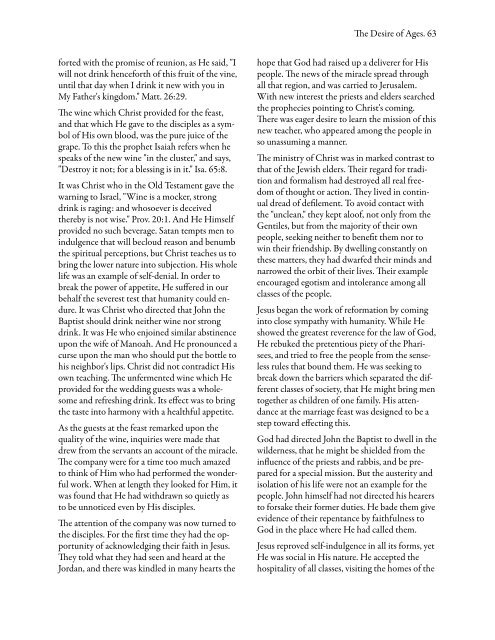The Desire of Ages - Christian Freebies
The Desire of Ages - Christian Freebies
The Desire of Ages - Christian Freebies
You also want an ePaper? Increase the reach of your titles
YUMPU automatically turns print PDFs into web optimized ePapers that Google loves.
forted with the promise <strong>of</strong> reunion, as He said, "I<br />
will not drink henceforth <strong>of</strong> this fruit <strong>of</strong> the vine,<br />
until that day when I drink it new with you in<br />
My Father's kingdom." Matt. 26:29.<br />
e wine which Christ provided for the feast,<br />
and that which He gave to the disciples as a symbol<br />
<strong>of</strong> His own blood, was the pure juice <strong>of</strong> the<br />
grape. To this the prophet Isaiah refers when he<br />
speaks <strong>of</strong> the new wine "in the cluster," and says,<br />
"Destroy it not; for a blessing is in it." Isa. 65:8.<br />
It was Christ who in the Old Testament gave the<br />
warning to Israel, "Wine is a mocker, strong<br />
drink is raging: and whosoever is deceived<br />
thereby is not wise." Prov. 20:1. And He Himself<br />
provided no such beverage. Satan tempts men to<br />
indulgence that will becloud reason and benumb<br />
the spiritual perceptions, but Christ teaches us to<br />
bring the lower nature into subjection. His whole<br />
life was an example <strong>of</strong> self-denial. In order to<br />
break the power <strong>of</strong> appetite, He suered in our<br />
behalf the severest test that humanity could endure.<br />
It was Christ who directed that John the<br />
Baptist should drink neither wine nor strong<br />
drink. It was He who enjoined similar abstinence<br />
upon the wife <strong>of</strong> Manoah. And He pronounced a<br />
curse upon the man who should put the bottle to<br />
his neighbor's lips. Christ did not contradict His<br />
own teaching. e unfermented wine which He<br />
provided for the wedding guests was a wholesome<br />
and refreshing drink. Its eect was to bring<br />
the taste into harmony with a healthful appetite.<br />
As the guests at the feast remarked upon the<br />
quality <strong>of</strong> the wine, inquiries were made that<br />
drew from the servants an account <strong>of</strong> the miracle.<br />
e company were for a time too much amazed<br />
to think <strong>of</strong> Him who had performed the wonderful<br />
work. When at length they looked for Him, it<br />
was found that He had withdrawn so quietly as<br />
to be unnoticed even by His disciples.<br />
e attention <strong>of</strong> the company was now turned to<br />
the disciples. For the rst time they had the opportunity<br />
<strong>of</strong> acknowledging their faith in Jesus.<br />
ey told what they had seen and heard at the<br />
Jordan, and there was kindled in many hearts the<br />
e <strong>Desire</strong> <strong>of</strong> <strong>Ages</strong>. 63<br />
hope that God had raised up a deliverer for His<br />
people. e news <strong>of</strong> the miracle spread through<br />
all that region, and was carried to Jerusalem.<br />
With new interest the priests and elders searched<br />
the prophecies pointing to Christ's coming.<br />
ere was eager desire to learn the mission <strong>of</strong> this<br />
new teacher, who appeared among the people in<br />
so unassuming a manner.<br />
e ministry <strong>of</strong> Christ was in marked contrast to<br />
that <strong>of</strong> the Jewish elders. eir regard for tradition<br />
and formalism had destroyed all real freedom<br />
<strong>of</strong> thought or action. ey lived in continual<br />
dread <strong>of</strong> delement. To avoid contact with<br />
the "unclean," they kept alo<strong>of</strong>, not only from the<br />
Gentiles, but from the majority <strong>of</strong> their own<br />
people, seeking neither to benet them nor to<br />
win their friendship. By dwelling constantly on<br />
these matters, they had dwarfed their minds and<br />
narrowed the orbit <strong>of</strong> their lives. eir example<br />
encouraged egotism and intolerance among all<br />
classes <strong>of</strong> the people.<br />
Jesus began the work <strong>of</strong> reformation by coming<br />
into close sympathy with humanity. While He<br />
showed the greatest reverence for the law <strong>of</strong> God,<br />
He rebuked the pretentious piety <strong>of</strong> the Pharisees,<br />
and tried to free the people from the senseless<br />
rules that bound them. He was seeking to<br />
break down the barriers which separated the different<br />
classes <strong>of</strong> society, that He might bring men<br />
together as children <strong>of</strong> one family. His attendance<br />
at the marriage feast was designed to be a<br />
step toward eecting this.<br />
God had directed John the Baptist to dwell in the<br />
wilderness, that he might be shielded from the<br />
inuence <strong>of</strong> the priests and rabbis, and be prepared<br />
for a special mission. But the austerity and<br />
isolation <strong>of</strong> his life were not an example for the<br />
people. John himself had not directed his hearers<br />
to forsake their former duties. He bade them give<br />
evidence <strong>of</strong> their repentance by faithfulness to<br />
God in the place where He had called them.<br />
Jesus reproved self-indulgence in all its forms, yet<br />
He was social in His nature. He accepted the<br />
hospitality <strong>of</strong> all classes, visiting the homes <strong>of</strong> the


